Why are so many Germans protesting against Coronavirus restrictions?
Not just the Germans, but the Brits, Aussies, Irish, and Americans, to name a few, are also holding protests in cities worldwide. But why are so many risking being arrested, fines, or imprisonment to protest against the lockdown measures? With the rise of self-publishing, government and media mistrust reaching far and wide, and an on-going relationship between right-wing groups and the anti-vaxx movement – it isn’t surprising that we see civil unrest.
Many anti-coronavirus lockdown demonstrations in Germany are backed and organised by far right-wing groups, including the fast-growing Querdenker based in the East of Germany. The premise behind many of the demonstrations is deeply-seated in the idea that much of the mainstream news is, in fact, ‘fake news’ and in strong media and government mistrust.
Fake news is a relatively new term referring to ‘news,’ which is factually incorrect (or a self-published opinion), which is being widely circulated, usually on Twitter, Facebook, or other social platforms, and taken as fact. Some anti-lockdown protests have been heavily centred around the idea that government and media are co-conspirators and are together hood-winking the general population. Many people protesting, for this reason, believe that the Coronavirus is not real and that rather than a pandemic, we are experiencing a ‘plandemic‘. The definition of ‘plandemic’ is as a pandemic planned by governments worldwide to limit the freedoms of individuals, increase state control of people and create a ‘new world order’ – a totalitarian, one-world government.
To combat Covid-19 governments worldwide are working on a vaccine due for deployment worldwide. The idea of a worldwide vaccine for all fits snugly with many anti-vaxxer beliefs that if, or when, a vaccine is released, this is is simply a government ploy for control and yet another blow to individual freedom. As such, many demonstrations in Germany have seen the groups questioning government ethics and the anti-vaxx movement protest side by side.
This ideology is being widely circulated online through self-publishing platforms including Reddit, social media and niche sites, many of which are host to conspiracy theories, creating an ever-widening gap between those who trust the government and those who don’t.
As if it’s not hard enough to work out what’s fake news and what’s real, we have to choose for ourselves what to consume, what political or moral stance we want to take. Confusing – as in our modern world, we are bombarded with information and often conflicting views at an almost impossible rate.
Social media, digital media and phone notifications are now part of our daily life – a constant update from our chosen media outlets, family and friends. With such a vast amount of information and outlets vying for our attention, we have no option but to choose what we consume which is viewed as a healthy form of self-care, to limit negative news, including news of Coronavirus.
However, self-care or not, the act of limiting the specific media messages consumed is likely to lead to diminishing opinions which don’t align with the individual’s own. This makes it unlikely the average person receives a balanced overview of current affairs as they ignore all but their own individually selected and trusted news sources.
As such, where we sit on the political spectrum has never been more relevant because our chosen news reinforces our personal views multiple times a day. With this in mind, it’s easy to see how extreme (and not so radical) movements can grow followings faster than in previous times – people can connect, discuss and bat around ideas with like-minded pals and, ultimately, share ‘news’ that supports their agenda. This ultra-connectedness could go some way to explain why more and more protests are springing up across Germany and why they are becoming increasingly violent.
Interestingly, it doesn’t appear to be personal economic ruin driving these protests. The German government announced the first restrictions and lockdown on March 20th, within three days offered thousands of Euros in grants to small and medium businesses and, as of November 2020, each company will receive an additional 75% of 2019’s profit margin as a lump sum).
Individual workers received 80% of their salary, much the same as the UK furlough scheme, and people have survived on that. There is an exception to this rule, of course. According to the website Erobella, sex workers and those who fall ‘outside of society’ have been severely affected by the Coronavirus restrictions. In fact, several protests have been staged across Germany by sex workers and advocates of sex workers rights lobbying for support or for their right to return to work. At the time of writing, the German government hasn’t offered additional support to these vulnerable people.
So, while it appears that groups who fall outside of the ‘norm’ (or a centralist political stance) are the most likely to be involved in the protests happening across Germany, it is not easy to see how this life will revert back to normal life, certainly not until the pandemic ends.

